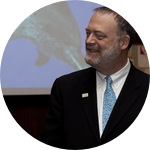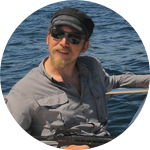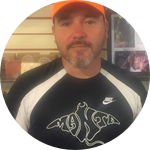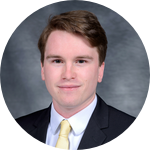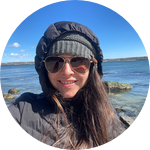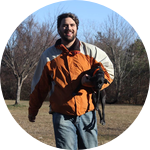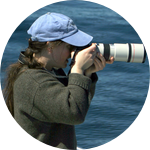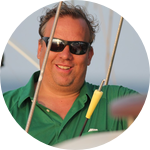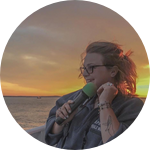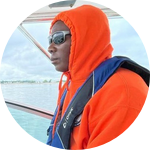About This Project
Heavy metals are a ubiquitous environmental pollutant that threaten the health of humans, wildlife, and ecosystems. We have studied metal pollution in the Gulf of Maine humpback whales since 2010, showing remarkably high levels of Al, Cr, and Ni. To better understand how toxic metals affect the health of humpback whales, we aim to assess differences in biological age from chronological age and link the differences to heavy metal levels.
Ask the Scientists
Join The DiscussionWhat is the context of this research?
Ocean pollution is a global health concern. While much of the focus is on plastics and organic chemicals, metals pollution is often more sinister and overlooked. Metals are naturally occurring, ubiquitous, cannot be degraded or metabolized into less toxic forms, and are often overlooked as metals pollution is typically not visible to the naked eye. Metals can act as gerontogens - chemicals that accelerate biological aging. We have studied metal pollution in the Gulf of Maine humpback whales since 2010, while the Center for Coastal Studies has monitored this population since the 1970s and knows the chronological age of many of these whales. Here, we aim to distinguish chronological age from biological age and assess the influence of heavy metals.
What is the significance of this project?
Ocean pollution poses a significant threat to human, wildlife, and ecosystem health. While ocean pollution may seem like an obvious issue, how pollution affects ecosystems and wildlife health is poorly studied. Aging is something all living creatures must contend with, and health issues are more prevalent in aging populations. While we have studied aging in humans for many decades, very little is understood about aging in wildlife or what contributes to accelerated aging.
We focus on whales as they are also a long-lived mammalian species at the apex of their ecosystem, and ocean pollutants will impact their health before affecting human health. Understanding how pollutants contribute to aging will further enable us to improve conservation methods to better protect their populations.
What are the goals of the project?
Our plan is to collect skin biopsies from Gulf of Maine humpback whales in September 2022, then assess 26 metal levels and aging biomarkers in skin. The samples will be analyzed in fall and winter 2022, then communicated in spring 2023 to the scientific community and the general public. We will assess differences between biological age (organ/body age) and chronological age (calendar age), then use rigorous statistical analyses to evaluate associations of metal levels with differences observed between biological and chronological ages.
Subsequent work will use cell cultures developed from the skin samples to study how metals induce biological aging in skin cells. We will compare results in whale cells to human cells to translate results between species.
Budget
The project has four major cost components: 1) Boat time to collect the samples; 2) Sample analyses costs; 3) Sample shipping from Gloucester, MA to Louisville, KY; 4) housing costs. Our personnel costs are either being covered by our individual employers or are being volunteered. The budget is essential to help cover our ship time, analyses, and project management costs.
Endorsed by
 Project Timeline
Project Timeline
The project will move in four phases. Phase 1 is sample collection in August2022 with precise dates selected by April 5, 2022. Phase 2 will be sample analysis where we measure the metals and aging biomarkers in the samples and determine the sex of the whales sampled. We expect these to be complete by November 30, 2022. Phase 3 is data and statistical analysis, which should be complete by February 2023. Phase 4 will be data publication, which will be submitted by April 2023.
Apr 27, 2022
Project Launched
Sep 06, 2022
Travel to Gloucester, MA for 5 days humpback whale sampling using standard biopsy techniques with biopsy darts and crossbows.
Nov 30, 2022
Complete assessment of metals in skin samples using inductively couples plasma mass spectrometry (ICP-MS)
Dec 23, 2022
Complete analysis of aging biomarkers in skin using immunohistochemistry with aging biomarkers (p21, p16)
Mar 31, 2023
Publish results in peer-reviewed journal
Meet the Team
Affiliates
Affiliates
Affiliates
Affiliates
Affiliates
Affiliates
Team Bio
We are a team of scientists and educators who excel in the field and the laboratory. Each member has experience with wildlife especially whales, sea turtles and alligators. We have worked together for over 10 years tackling difficult and important questions in the health of our environment. Each member brings their individual experience and strengths that allow use to collect the samples, analyze them and effectively communicate the results to both the scientific community and the public.
Johnny Wise
Dr. Johnny Wise earned his Ph.D. from Purdue University in neurotoxicology. Currently he is an Assistant Professor in the Department of Pediatrics at the University of Louisville, with a research focus on the interaction of toxicology and aging. Dr. Wise uses what we colloquially refer to as a "toxic aging coin": heads we consider how age impacts the neurotoxic outcome of metals, tails we consider how metals acts as gerontogens and contributes to biological aging of the brain. He has studied whales and metals toxicology since 2010 and has voyaged in the Gulf of Maine, Gulf of Mexico, Sea of Cortez, and around the Channel Islands near Santa Barbara, CA, most often serving as the primary biopsier to collect samples from the whales. While at sea you can most often find him in the crow's nest searching for whales, or on the bowsprit of the boat ready to biopsy. He is often singing and dancing while at sea, using his talents to draw the whales in closer.
Mark Patrick Martin
I had the luxury of growing up around sharks and bioluminescence.
I truly believe one has to spend time around nature and its creatures to even begin to understand them. This combined with good science is the key to beginning to apply the science to make real changes without losing sight of nature's way and how it's changing.
Having the fantastic opportunity to grow up in a Caribbean island I learned a great amount from interacting with the sea. From a young age I learned about ships, marine biodiversity and the sea. I then had the chance to develop professionally as the chief field researcher for the Vieques Conservation & Historical Trust working on collaborations with the Wise Toxicology Labs, Woods Hole Oceanographic Institute, Scripps Institute of Oceanography and a Variety of international university and federal agencies, including the White House Sustainability Task Force for Vieques. I'm currently in my last year of specializations degrees in Oceanography and Marine Resource Management. For the last twelve years I have been working on research of the Bioluminescent bay systems, Light pollution control and monitoring, environmental education, advocacy and policy for sustainability and conservation strategies. We work on everything from sharks to lionfish and mangroves and we strive to transfer the data to the general public in a fun and digestible way.
I am a licensed volunteer for the USGS and founded the Marine Life exhibit at the VCHT, an interactive aquarium known as "the smallest aquarium in the world". I was one of the creators of the award winning MANTA educational program, a citizen science, field activity based conservation educational system see vcht.org
Our excursion on the Sea of Cortes is crucial to continue to ride the wave of the scientific and social revolution that is happening, as we see what we are doing to the world and realizing we have a chance to do something about it.
Sam Vielee
I grew up in Indianapolis, IN before attending the University of Alabama where I earned my bachelor's degree in Biology while also studying Psychology and Global & Cultural Perspectives. I have always been fascinated with science, specifically neuroscience, and studied the effects of pesticides on the development of neurodegenerative diseases while at UA. After graduating from UA, I joined the Department of Pharmacology & Toxicology at the University of Louisville under an IPIBS pre-doctoral fellowship. I am currently pursuing both an MS and PhD in Pharmacology & Toxicology. I recently joined the NeuroWise Lab of Environmental Neurotoxicology to examine how environmental pollution is impacting neurodegeneration in people. We specifically examine how hexavalent chromium induces genotoxic effects and leads to accelerated biological aging and, ultimately, the death of neurons. We employ the One Health Model to examine human, wildlife, and environmental health through a single scope to create a deeper understanding of how our health is intertwined.
Jamie Young
When you walk out your front door, what do you see? A busy street, bustling with morning commuters? A stand of tall oaks, with large green leaves glistening in the sun?
I see science. I see mysteries that are ready to be solved. This is how I have always seen the world. This perspective has been my North Star, guiding me in my pursuit of a career in environmental toxicology. I am interested in studying the impact of environmental contaminants on human, animal and ecosystem health as they are intimately linked. My hope is that by educating the public and sharing results from studies, such as the ones in the Gulf of Maine, we can better understand the complexities of our ecosystems.
James Wise
For all my life I have had a passion for science and the environment. As I have grown personally and professionally, my interests are focused on environmental health issues and how the health of the environment is important for the health of both humans and animals. Specifically, I am interested in understanding how chemicals cause cancer, impact wildlife and finding better solutions to these problems. I find the problem solving aspects of these fields intriguing and the chance to help out society and environment as a whole very fulfilling. My goals are to future my skills and experiences in sciences and continue to study these problems and share my knowledge and experiences with others in the community. I have extensive training in field studies involving environmental health and studying whales.
Jooke Robbins
Dr. Jooke Robbins is a Senior Scientist at the Center for Coastal Studies (Provincetown, Massachusetts) and the Director of its Humpback Whale Studies Program. She holds a Ph.D. in marine biology from the University of St. Andrews, Scotland. Jooke has studied humpback whales since 1995 and has active research programs in the North Atlantic and the South Pacific Oceans. Her work focuses on baleen whale biology, population structure & dynamics and human impacts.
Jooke directs the Gulf of Maine Humpback Whale Catalog, which has followed individual humpback whales since the 1970s. Her team uses a range of techniques to determine individual age, sex, relatedness, reproductive history, behavior, distribution patterns and exposure to human impacts.
John Wise
My passion for science and wildlife began when I was a young child fascinated by the world around us. I have studied and trained and shaped my career around that passion, focusing it on understanding the impact of the environment on the health of people, animals and the ecosystem. For me, whether it is our work in the tiny, microscopic world of a cell or our work out in the wild with some of the most amazing creatures on earth, being a scientist is always a thrill and a privilege. To be a scientist is one part explorer. You venture into unknown aspects of the world and discover things no one has realized or seen before. It is one part detective. You don your Sherlock Holmes hat, open your mind, and gather evidence to solve mysteries and explain puzzles that underlie your new discoveries. It is one part artist. You experience even more deeply the beauty and wonder of the world and you present your discoveries in images, words and ideas. It is one part dreamer. You step back in amazement and wonder and imagine what you might find next. But to me, the most important part, the most exciting part, is to be able share all of these aspects with others and to be an educator. We all thirst to know more, to understand more. We seek to be amazed and inspired by the world. Thus, for me, engaging others in my scientific quests, teaching them and learning from them, is a central part of being a scientist. I hope you will join me on this next quest.
Jamie Mcwilliams
Since I can remember I have always been completely fascinated with the world around us, especially animals and how we interact with them. Although I was fascinated with all life around me, whales and the ocean that surrounds them has always been my greatest interest. I grew up in Texas where I was landlocked until I accepted an internship position with Cape Ann Whale Watch. Right out of high school, I moved across the country and worked as an unpaid intern for five months. An internship that would soon change my life and kickstarted my love for science communication.
Since then, I have attended school at Texas A&M University Corpus Christi where I received a background in Environmental Science & Marine Biology. I began volunteering at the Texas Sealife Center; where we rescue, rehabilitate, and release sea turtles and other coastal wildlife. In 2017, I returned back to the Gulf of Maine to pursue my passion and become the Education Director and full time naturalist for Cape Ann Whale Watch. I fall more in love with the whales every moment I spend in their presence or learning about them; and I am so excited to have the ability to continue sharing my passion for them with those around me for years to come. Baba Dioum once said "In the end, we conserve only what we love, we love only what we understand, and we understand only what we are taught". I take being a science communicator very seriously and I am excited to continue taking critical information, sharing it with the public, and hopefully inspiring change. As the whales, and their environment, could surely use all of the protection they can get.
J. Calvin Kouokam
I was born and raised in Cameroon, a country situated on the West coast of Africa right above the equator. Growing up I have always hoped to help improve human health. Initially, I have studied microorganisms from different angles to develop adequate treatments for various infections. However, in the past years I have refocused my career on metal carcinogenesis.
In the context of growing environmental pollution around the world,
multiple diseases are increasing in incidence, including cancer. In this new field of research we can learn a lot from animals such as whales, which although exposed to high levels of metal toxicants, do not develop cancer as much as humans. Data generated from such studies may help develop tools for the treatment of cancer and other diseases in humans.
Project Backers
- 20Backers
- 73%Funded
- $7,210Total Donations
- $360.50Average Donation
